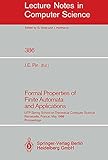Formal Properties of Finite Automata and Applications [electronic resource] : LITP Spring School on Theoretical Computer Science Ramatuelle, France, May 23–27, 1988 Proceedings / edited by J. E. Pin.
Material type: TextSeries: Lecture Notes in Computer Science ; 386Publisher: Berlin, Heidelberg : Springer Berlin Heidelberg, 1989Description: X, 266 p. online resourceContent type: text Media type: computer Carrier type: online resourceISBN: 9783540467212Subject(s): Computer science | Combinatorics | Computer Science | Mathematical Logic and Formal Languages | Computation by Abstract Devices | CombinatoricsAdditional physical formats: Printed edition:: No titleDDC classification: 005.131 LOC classification: QA8.9-QA10.3Online resources: Click here to access online
TextSeries: Lecture Notes in Computer Science ; 386Publisher: Berlin, Heidelberg : Springer Berlin Heidelberg, 1989Description: X, 266 p. online resourceContent type: text Media type: computer Carrier type: online resourceISBN: 9783540467212Subject(s): Computer science | Combinatorics | Computer Science | Mathematical Logic and Formal Languages | Computation by Abstract Devices | CombinatoricsAdditional physical formats: Printed edition:: No titleDDC classification: 005.131 LOC classification: QA8.9-QA10.3Online resources: Click here to access online  E-BOOKS
E-BOOKS
| Current library | Home library | Call number | Materials specified | URL | Status | Date due | Barcode |
|---|---|---|---|---|---|---|---|
| IMSc Library | IMSc Library | Link to resource | Available | EBK5875 |
Finite automata and rational languages an introduction -- The wreath product and its applications -- Polynomial decomposition of rational functions / Decomposition polynomiale des fonctions rationnelles -- Relational morphisms, transductions and operations on languages -- Basic techniques for two-way finite automata -- Properties of factorization forests -- Relative star height, star height and finite automata with distance functions -- Automata and the word problem -- Automata and quantifier hierarchies -- Concatenation product: a survey -- A finiteness condition for semigroups -- Equations for pseudovarieties -- Algorithms and automata -- Numbers and automata -- Codes and automata -- Finite automata and computational complexity -- A characterization of fair computations of finite state SCCS processes -- Verification of distributed systems: An experiment.
The volume contains the proceedings of the 16th Spring School on Theoretical Computer Science held in Ramatuelle, France, in May 1988. It is a unique combination of research level articles on various aspects of the theory of finite automata and its applications. Advances made in the last five years on the mathematical foundations form the first part of the book. The second part is devoted to the important problems of the theory including star-height, concatenation hierarchies, and connections with logic and word problems. The last part presents a large variety of possible applications: number theory, distributed systems, algorithms on strings, theory of codes, complexity of boolean circuits and others.


There are no comments on this title.